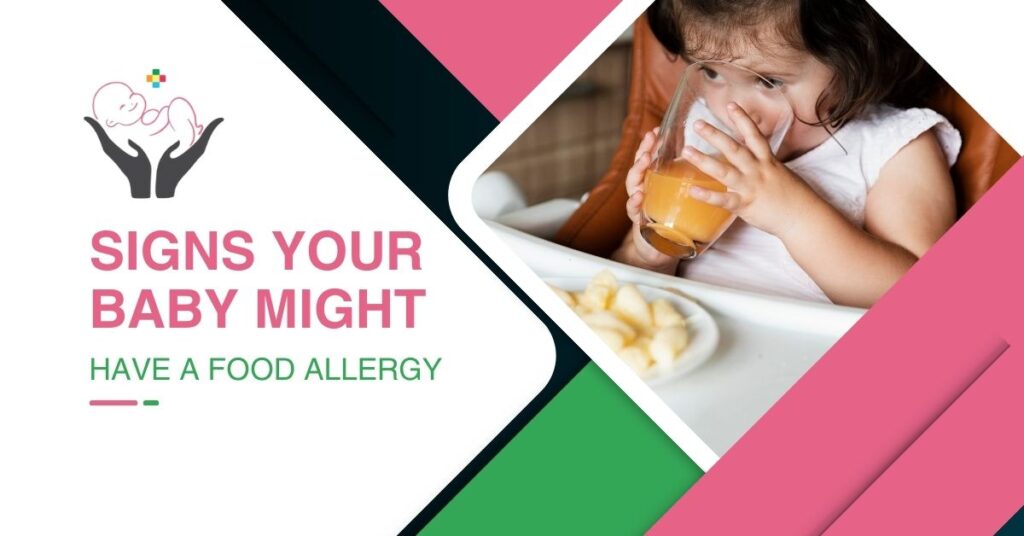Many parents can deal with the food allergy of an infant from the early days, and can give rise to stress and uncertainty. Early detection and proper management can prove important to ensure that your child remains healthy.
Doctors at the Pediatric New Born Clinic, we emphasize the alarming symptoms that parents should notice to avoid further issues. This enables you to form a secure eating practice which in turn helps with your baby’s growth and development. This detailed manual takes you through the usual food allergy symptoms in infants and provides helpful remedies that every parent needs to be aware of.
Understanding Food Allergies in Babies
A food allergy happens when the immune system of a child interprets an accurate food protein as a treat and answers reactively. This immune response may affect respiratory tract, digestive tract or skin, causing light to severe symptoms.
Because food allergies and food restrictions are often confused, it is also important for parents to understand the difference between the two. Food allergies can cause serious immune responses and may need instant medical care, while restrictions generally cause digestive problems.
For children, milk, eggs, peanuts, soy, wheat, fish and tree nuts are the most common allergens. Parents who know this can take preventive measures and continuously monitor their child.
Common Signs and Symptoms of Food Allergies in Babies
Parents often notice symptoms soon after their child eats a certain food. Recognizing these early can make a crucial difference in getting the right care:
Skin Reactions
Redness, hives (raised itchy bumps), eczema flare-ups, or swelling around the face and mouth are typical signs of a food allergy. These skin reactions often appear within minutes to a few hours after consuming the allergen.
Digestive Symptoms
Vomiting, diarrhea, colic-like excessive crying, or gas can signal that the gastrointestinal tract is affected. Parents should learn to distinguish between usual digestive upset and more concerning symptoms linked to allergies.
Respiratory Problems
Coughing, wheezing, nasal congestion, or difficulty breathing are serious signs of an allergic reaction. These require immediate medical attention as they can escalate quickly.
Swelling
Swelling of the lips, tongue, or throat is a clear warning sign of a potentially severe reaction, and immediate action is critical to prevent anaphylaxis.
Behavioral Changes
Excessive fussiness, irritability, or lethargy after feeding may also be connected to food allergies and should not be overlooked.
When Should You Seek Medical Attention?
You should consult a paediatrician right away if your child experiences any combination of the symptoms listed above after consuming a new food. To ascertain what is happening and to guarantee safe next steps, a thorough history, examination, and potentially allergy testing will be helpful.
You should get medical help right away if your baby is having trouble breathing, has facial or throat swelling, is vomiting frequently, or faints. Early detection and treatment are essential because severe reactions to food allergies can occur rapidly.
Managing Food Allergies in Babies
Managing food allergies is about both prevention and preparedness. Parents can take several steps to create a safe environment for their baby:
Introducing Solid Foods Safely
Offer one new food at a time, waiting 3 to 5 days before introducing another. This makes it easier to identify potential allergens.
Reading Food Labels
Parents should carefully check packaged foods for hidden allergens to prevent accidental exposure.
Emergency Preparedness
For children with severe allergies, keeping emergency medication prescribed by a pediatrician on hand and learning to recognize signs of anaphylaxis is crucial.
Nutritional Support
Even when allergenic foods must be avoided, it is essential to ensure the diet remains balanced and nutritious to support healthy development.
Prevention and Long-Term Care
Some food allergies in infants may disappear when they grow up, and some may remain in later life. Regular follow-up ensures reassessment and helps in monitoring progress.
By avoiding intermediate pollution and ensuring that the guardians know about the allergy security, parents can maintain a safe supply environment.
Babies with food allergies can grow, healthy and have a happy childhood if they get proper care and precautions.
Conclusion
Although food allergies in infants can be worrisome, they can be successfully treated with early detection and appropriate treatment. The Pediatric Newborn Clinic emphasises that the best ways to keep your baby safe and healthy are to recognise symptoms early, stay away from triggers, and be ready for emergencies.
Parents can guarantee their child’s well-being and lay the groundwork for long-term health by remaining knowledgeable and proactive.



